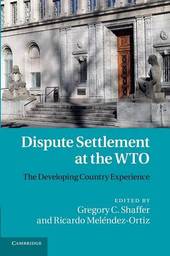
|
Dispute Settlement at the WTO: The Developing Country Experience
Paperback / softback
Main Details
| Title |
Dispute Settlement at the WTO: The Developing Country Experience
|
| Authors and Contributors |
Edited by Gregory C. Shaffer
|
|
Edited by Ricardo Melendez-Ortiz
|
| Physical Properties |
| Format:Paperback / softback | | Pages:372 | | Dimensions(mm): Height 229,Width 152 |
|
| Category/Genre | International trade |
|---|
| ISBN/Barcode |
9781107684683
|
| Classifications | Dewey:343.087 |
|---|
| Audience | | Professional & Vocational | |
|---|
| Illustrations |
14 Tables, black and white; 9 Line drawings, unspecified
|
|
Publishing Details |
| Publisher |
Cambridge University Press
|
| Imprint |
Cambridge University Press
|
| Publication Date |
20 February 2014 |
| Publication Country |
United Kingdom
|
Description
This examination of the law in action of WTO dispute settlement takes a developing-country perspective. Providing a bottom-up assessment of the challenges, experiences and strategies of individual developing countries, it assesses what these countries have done and can do to build the capacity to deploy and shape the WTO legal system, as well as the daunting challenges that they face. Chapters address developing countries of varying size and wealth, including China, India, Brazil, Argentina, Thailand, South Africa, Egypt, Kenya and Bangladesh. Building from empirical work by leading academics and practitioners, this book provides a much needed understanding of how the WTO dispute settlement system actually operates behind the scenes for developing countries.
Author Biography
Ricardo Melendez-Ortiz is the co-founder and Chief Executive of the International Centre for Trade and Sustainable Development (ICTSD). Gregory C. Shaffer is Melvin C. Steen Professor of Law at the University of Minnesota Law School.
Reviews'The original material provided by the case studies in this volume of essays will ... enrich the work of commentators and scholars, who should draw upon them when writing about developing countries' use of the WTO dispute settlement. They ... have much to learn.' Mary E. Footer, European Journal of International Law 'Given the serious domestic governance shortcomings in most of the countries examined - which virtually certainly exist in other countries - and given the extreme political difficulties of changing retaliation rules, the focus on domestic governance and improved operation within the existing system is not only a sound one, but also the only realistic one. The book deserves credit for the clarity with which it makes this general point, all the while permitting a nuanced, country-specific analysis that does justice to the peculiarities and specific challenges of each of the examined countries.' World Trade Review
|